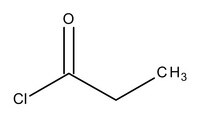807063 Sigma-AldrichPropionyl chloride
Propionyl chloride for synthesis. CAS No. 79-03-8, EC Number 201-170-0.
More>> Propionyl chloride for synthesis. CAS No. 79-03-8, EC Number 201-170-0. Less<<Synonyms: Propionic acid chloride
Recommended Products
Overview
| Replacement Information |
|---|
Key Spec Table
| CAS # | EC Number | Hill Formula | Chemical Formula | Molar Mass |
|---|---|---|---|---|
| 79-03-8 | 201-170-0 | C₃H₅ClO | CH₃CH₂COCl | 92.52 g/mol |
Products
| Catalogue Number | Packaging | Qty/Pack | |
|---|---|---|---|
| 8.07063.0100 | Glass bottle | 100 ml | |
| 8.07063.0500 | Glass bottle | 500 ml |
| Description | |
|---|---|
| Catalogue Number | 807063 |
| Synonyms | Propionic acid chloride |
| References |
|---|
| Product Information | |
|---|---|
| CAS number | 79-03-8 |
| EC index number | 607-093-00-2 |
| EC number | 201-170-0 |
| Hill Formula | C₃H₅ClO |
| Chemical formula | CH₃CH₂COCl |
| Molar Mass | 92.52 g/mol |
| HS Code | 2915 90 70 |
| Structure formula Image | |
| Quality Level | MQ200 |
| Applications | |
|---|---|
| Application | Propionyl chloride for synthesis. CAS No. 79-03-8, EC Number 201-170-0. |
| Biological Information |
|---|
| Dimensions |
|---|
| Materials Information |
|---|
| Toxicological Information | |
|---|---|
| LD 50 oral | LD50 Rat 823 mg/kg |
| Safety Information | |
|---|---|
| Categories of danger | highly flammable, harmful, corrosive |
| Product Usage Statements |
|---|
| Storage and Shipping Information | |
|---|---|
| Storage | Store below +30°C. |
| Packaging Information |
|---|
| Supplemental Information |
|---|
| Specifications | |
|---|---|
| Color according to color reference solution Ph.Eur. | colorless liquid |
| Assay (GC, area%) | ≥ 98.0 % (a/a) |
| Density (d 20 °C/ 4 °C) | 1.057 - 1.059 |
| Identity (IR) | passes test |
| Global Trade Item Number | |
|---|---|
| Catalogue Number | GTIN |
| 8.07063.0100 | 04022536393605 |
| 8.07063.0500 | 04022536393612 |
Documentation
Propionyl chloride SDS
| Title |
|---|
Propionyl chloride Certificates of Analysis
| Product Number | Packaging | Specification | Lot Number |
|---|---|---|---|
| 8.07063.0100 | Glass bottle | PDF Specification Document | |
| 8.07063.0500 | Glass bottle | PDF Specification Document |










